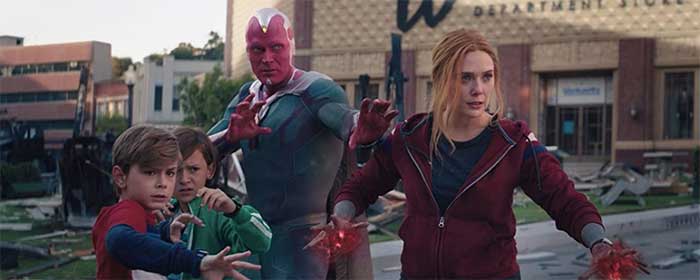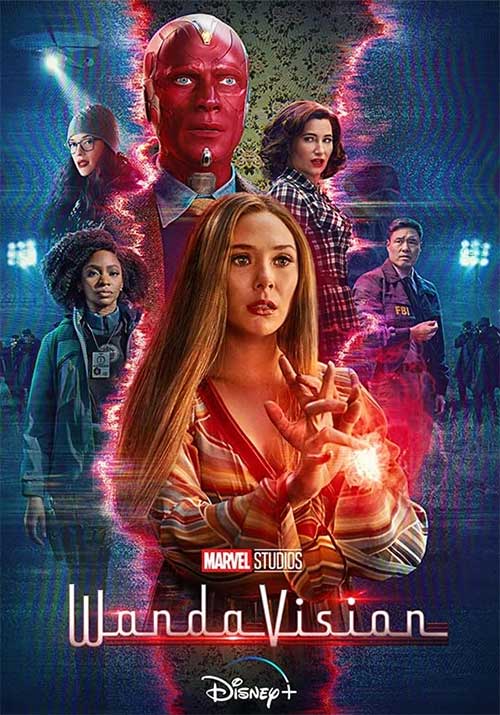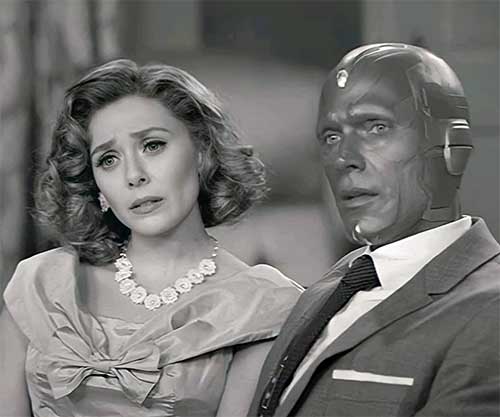Movies /
Comics Movie Reviews
WandaVision (2021) Review

By Hervé St-Louis
September 26, 2021 - 00:34
Newlywed Wanda Maximoff and Vision move to a small town of Westview in a new house so that they can live as a happily married couple. Their life is an idyllic black and white world of the 1950s. The problem is that Vision was destroyed by Thanos and that their lives keep updating from decade to decade, and their lives keeps changing, with new kids coming into their lives. What is happening in the world of Wanda Maximoff, the Scarlet Witch and Vision, the synthezoid?
This series was incredible although, like most series on streaming television, it has long episodes where the story is caught in plot details. My review will be from the perspective of a comic reader who read the original Scarlet Witch and Vision comics from the 1980s and has followed their travails and hardships in the Avengers,
the Westcoast Avengers, and much more over the years. I know the story of Wanda Maximoff and Vison inside out, including the odd marriage between and artificial intelligence and a human (okay, a mutant).
When comic writers Roy Thomas and Steve Englehart created the stories that saw Scarlet Witch fall in love and eventually marry the Vision, they were trying to add pathos to the Avengers’ comic by using the characters that they could modify because they had no series of their own. Some concerns which interest me such as the human-computer interaction angle of having a human develop a romantic relationship with a machine are of interest to me and create many philosophical questions which where barely addressed by then. At most, we got a story where we were told that “even an android can cry.”
Even an Android can cry is and the title of one of the episodes where, much like the comic, Vision asks what he is exactly. How does he exist? The Marvel Cinematic Universe (MCU) has dug deeply in the rich source material but made sense of it for a new generation. Instead of explaining Vision’s “soul” as being a residue of the brain patterns of another man, Simon Williams, the superhero known as Wonder Man, his mind was the produce of the mind stone and more artificial intelligence developed by Tony Stark. Some of the complexities have been erased but the epic story and pathos are the same.
In essence, Marvel Studios did what Warner Bro animation has been doing for decades. They take convoluted material from the comics, clean it while keeping the pathos attached to the source material and present it to a new audience with a twist and dynamic ways. The idea of the decades-based television series through which
WandaVision is staged is remarkable and instead of mixing old comics with the materials, borrow from adjoining television lore. This series is played as a modernized version of a television show after all. Streaming television is still television after all.
Wanda Maximoff’s fall into madness, the creation of her children, the advent of cartoonist
John Byrne's rebooted white Vision are all trademarks of the comics expressed beautifully here. The story of Wanda Maximoff has always amazed comic readers. At first an undefined weak female character, she became something else. She became more than a woman who could change probability with her hex powers, she became a real witch who changed reality as she saw fit and was broken beyond redemption many times.
I loved this series and the acting by Elizabeth Olsen and Paul Bethany. They are perfect as Wanda Maximoff and Vision. She is irrational and thinking about her needs first, while truly loving her husband. He is cold but caring and devoted to her. There are aspects of F. Scott Fitzgerald’s
Tender is the Night with the distraught wife and the overprotective husband. It’s wonderful to think of all the rich cultural lore that one can find in this series.
An aspect that I loved as a comic geek is that Wanda Maximoff were finally explained as being about modifying probabilities like in the comics but to another level. In the MCU’s Avengers, the Scarlet Witch was turned into a Jean Grey clone with telekinetic, telepathic, and psionic powers. That is not who she is and never was who she was. In
WandaVision, she gained back her original powers and that is good. I don’t care is she keeps Jean Grey’s classic powers now!
What I found a bit annoying was the episode with Agatha Harkness and the following fight. The pace was slower than usual, and the confrontation felt like the typical villain reveal that was unnecessary. But in a sense, even that is a television trope. I also disliked how Monica Rambeau treated Wanda Maximoff as a victim while she treated her boos as a villain. At the end of the series, Wanda Maximoff, just like in the comics, had no redeeming values. She is evil and conceited.
The series breached into major Avengers’ lore and will continue in the future of the MCU. The cinematography was quite interesting as instead of straight magic, the Scarlet Witch’s powers had a physics’ aspect that mimic television transmission. The sets, the effects were very good.
P.S. creators Steve Englehart and John Byrne are not credited for their work which served as the source material for much of the series. This is an error on Marvel Studios and Disney's part.
Rating: 9 /10
Last Updated: January 17, 2025 - 08:20


